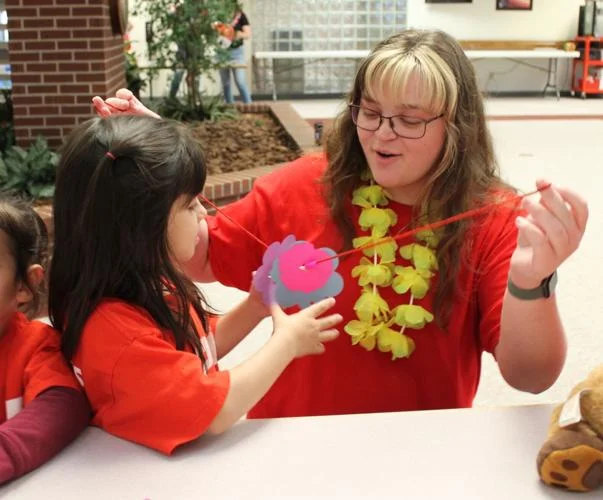ENID, Okla. — Enid preschoolers spent Thursday afternoon making more than just a splash of summertime fun as part of a final project for Northwestern Oklahoma State University students.
Fowler Early Childhood Center’s 60 pre-K students ventured next door for two hours of games, skits and dancing for the annual end-of-year program for students in NWOSU’s education department.
Three groups of 20 or so children rotated between three activity stations around the first floor’s common area — beach ball bowling, a crafts table stringing paper flowers into leis and a story-time reading in the library.
Harlie Whisenant, a junior studying education in Alva, helped man the bowling station, keeping watch over a kiddie pool filled with bags of fruit snacks a Fowler Cub would get after knocking over all six empty water bottles.
“It’s a fun way to get them active and get them excited,” Whisenant said, before admitting that the kids already were really excited about Thursday’s games (and knocking over more water bottles).
She said she and her 20 classmates in “Creative Activities for Elementary Teachers” had picked “Summer Splash” as this year’s theme partly because of wishful thinking.
“I think we’re all just ready for summer, just hanging on by a thread,” Whisenant said laughing.
Thursday’s annual program was the culmination of three days the future teachers had spent planning the various activities as the final project of their semester-long course with Martie Young, endowed chair of NWOSU’s education department.
All the planned activities ended about a half hour early, so Young’s students had to improvise with playing “Duck, Duck, Goose,” then asking the kids what their favorite activities were.
“Tomorrow it might take two hours, it’s just different — and that’s teaching,” Young said. “So you have all these … strategies and activities to keep them busy.”
Education junior Mary Smart’s part of the project was creating the day’s introductory skit about “rules of the pool” — created using red lines on the carpet in the middle of Northwestern’s common area.
Smart had ridden in on a pretend yellow school bus, while a classmate explained the rules about why not to run, why to use sunscreen and a floatie, why to drink plenty of water and so on.
“One thing’s for sure,” she said, “I gotta get myself back into shape to keep up with these young ones.”
As the Fowler children and their teachers did a round of the Hokey Pokey dance, NWOSU student Payton Hodgson said she planned to teach elementary students after graduating.
But, she added, Thursday’s activities were more energetic and fun, as kids put their left arms in and their left arms out.
Elementary kids are usually more hesitant to play at first, Hodgson said, because she thinks they develop more a “conscience.”
“(Pre-K kids) are more than willing to jump in and participate,” she said as the Fowler children shook it all about. “I mean, look at them, they’re over here putting their butts in and butts out, they don’t care.”
Young said children’s early age groups tend to be developmentally different, but training in Enid and other cities where her students live had a wide enough variety of opportunities for education students to learn about how to teach differently.
Students in Young’s course began working with children when a pre-K class was still in NWOSU-Enid’s building, but she said the end-of-year program was more compact before Fowler ECC opened next door in 2019.
Students who live in Enid while taking child education courses at NWOSU-Enid now regularly visit Fowler and Enid Public Schools’ elementary schools for classroom “field” experience and observation sessions. Young said NWOSU students like Hodgson who live elsewhere such as Ponca City or Blackwell complete their required field hours there.
She said students will have accrued around 650 hours of classroom experience before they graduate, 360 of which will be student-teaching as is required for certifications to teach in public schools in Oklahoma.
Teaching candidates who have completed an approved teacher education program also must have passed two state certification exams. A third required exam was eliminated by legislation signed into law last week.
Smart, who came to NWOSU in her early-40s, had worked from home in Douglas doing quality assurance for 15 years before getting laid off in late-2020 during the COVID-19 pandemic.
Suddenly without a plan B but with an associate degree, she realized she wanted to help fix the state’s teacher shortage, which had been exacerbated by the pandemic.
In the 2021-22 school year, more teachers than ever, a record 2,673, were approved to work in Oklahoma on emergency certifications — without teaching credentials but at least a bachelor’s degree.
Smart said she plans to be an elementary art teacher, which she learned had become a new career opportunity since she was in school.
“At least we’ve figured out how to be innovative … It’s making me a better parent,” Smart said. “It’s a win-win. I’m doing it for them, and I’m doing it for these kids like they’re my own.”
Article & Photo by: Alexander Ewald, Enid News & Eagle 5.13.22

